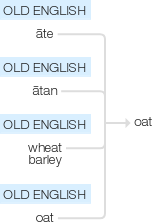Oat
Old English āte, plural ātan, of unknown origin. Unlike other names of cereals (such as wheat, barley, etc.), oat is not a mass noun and may originally have denoted the individual grain, which may imply that oats were eaten in grains and not as meal.
wiktionary
From Middle English ote, from Old English āte, from Proto-Germanic *aitǭ(“swelling; gland; nodule”), from Proto-Indo-European *h₁eyd-(“to swell”). See English atter.
etymonline
oat (n.)
type of cereal plant, Middle English ote, from Old English ate (plural atan) "grain of the oat plant, wild oats," a word of uncertain origin, possibly from Old Norse eitill "nodule," denoting a single grain, itself of unknown origin. The English word has cognates in Frisian and some Dutch dialects. Famously defined by Johnson as, "A grain, which in England is generally given to horses, but in Scotland supports the people." Related: Oats.
The usual Germanic name is derived from Proto-Germanic *khabran (source also of Old Norse hafri, Dutch haver, source of haversack). Figurative wild oats "youthful excesses" (the notion is "crop that one will regret sowing") is attested by 1560s, in reference to the folly of sowing these instead of good grain. Hence, feel (one's) oats "be lively," 1831, originally American English.
That wilfull and vnruly age, which lacketh rypenes and discretion, and (as wee saye) hath not sowed all theyr wyeld Oates. [Thomas Newton, "Lemnie's Touchstone of complexions," 1576]
Fred: I still want to sow some wild oats!
Lamont: At your age, you don't have no wild oats, you got shredded wheat.
["Sanford and Son"]
